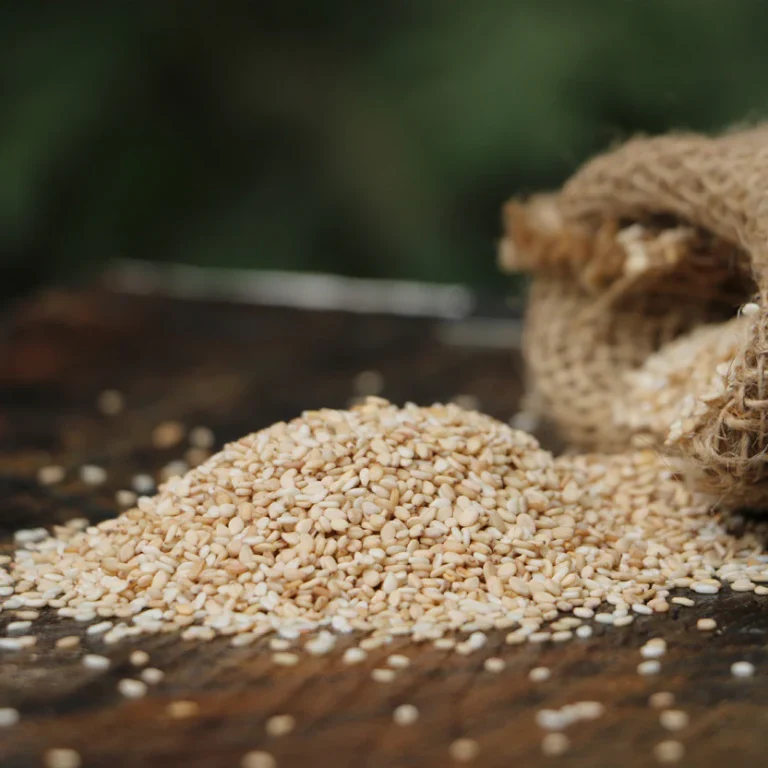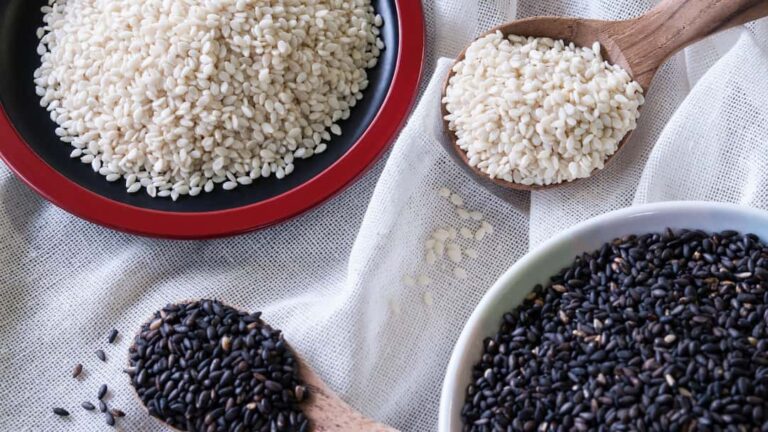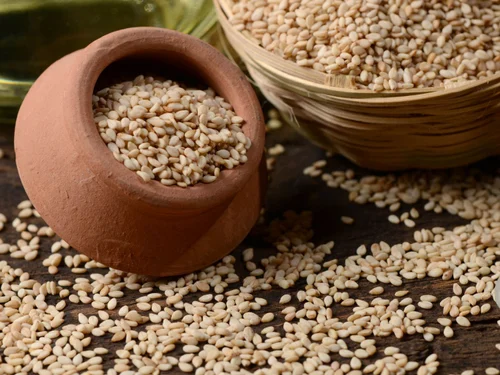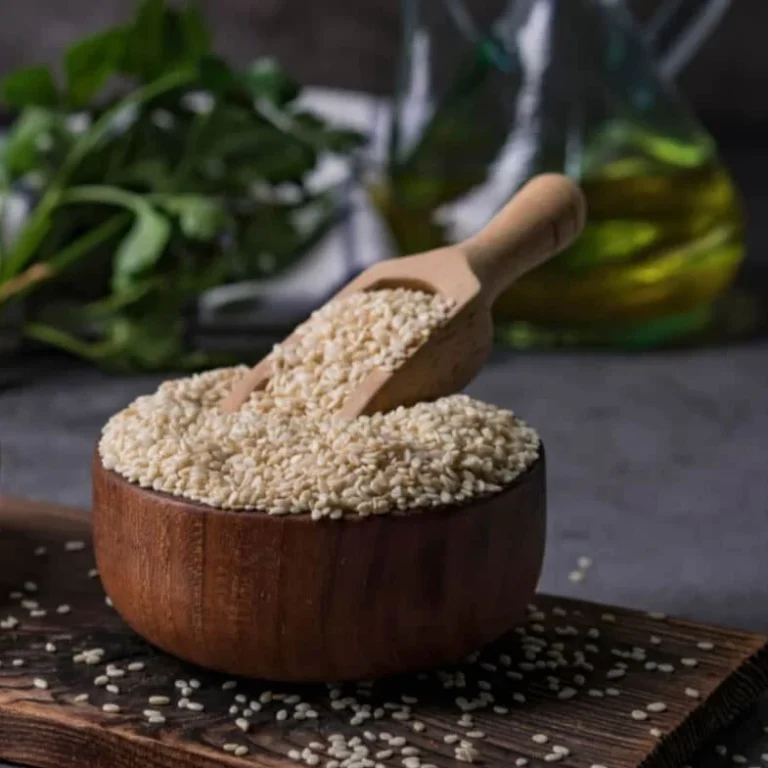
Sesame seeds are small but mighty powerhouses of nutrition, offering an array of health benefits that can significantly contribute to your daily dietary needs. From providing high-quality protein and fiber to boosting heart health and promoting weight loss, these tiny seeds have earned their place in both traditional and modern diets. Packed with essential nutrients, sesame seeds are one of the best sources of plant-based protein and fiber, making them a perfect addition to your meals.
In this article, we will dive deep into the nutritional breakdown of sesame seeds, highlighting their benefits, key nutrients, and how incorporating them into your diet can enhance your overall well-being.
What Are Sesame Seeds?
Sesame seeds come from the sesame plant (Sesamum indicum), a flowering plant that is believed to be one of the oldest cultivated crops in history. These seeds are small, flat, and oval-shaped, with a light tan or beige color. Despite their size, they are incredibly nutrient-dense and provide an abundance of vitamins, minerals, and antioxidants.
Rich in omega-3 fatty acids, protein, fiber, calcium, and other essential nutrients, sesame seeds are a perfect addition to your diet, whether you’re looking to improve heart health, enhance digestion, or support your body with a boost of plant-based protein and fiber.
Nutritional Value of Sesame Seeds
Here is a comprehensive breakdown of the key nutrients found in sesame seeds:
-
Protein: Sesame seeds are an excellent source of plant-based protein, which is crucial for muscle repair, immune function, and overall health. Protein makes up around 18% of the seed’s total weight.
-
Fiber: Fiber is essential for maintaining digestive health and promoting satiety, making sesame seeds an excellent option for those looking to manage their weight. Sesame seeds contain both soluble and insoluble fiber, supporting healthy digestion.
-
Healthy Fats: Sesame seeds are high in healthy fats, including omega-3 fatty acids, which are essential for brain health, reducing inflammation, and promoting heart health. These fats also support healthy skin and hair.
-
Calcium: One of the standout features of sesame seeds is their high calcium content. Calcium is crucial for maintaining strong bones and teeth, as well as supporting nerve function.
-
Magnesium: Magnesium is another key nutrient in sesame seeds, known for its role in regulating muscle and nerve function, blood sugar levels, and blood pressure.
-
Iron: Sesame seeds are a great source of iron, which is vital for the production of hemoglobin and helps oxygen travel throughout the body.
-
Vitamins: Sesame seeds are rich in Vitamin B-complex, Vitamin E, and other essential vitamins that promote overall health.
The Power of Protein in Sesame Seeds
Protein is one of the most essential nutrients for the body, and sesame seeds are an excellent source of plant-based protein. Protein is the building block of tissues, muscles, enzymes, and hormones. It is essential for growth, tissue repair, and immune function.
In fact, sesame seeds contain more protein than many other plant-based foods like pumpkin seeds and sunflower seeds. The protein content in sesame seeds is about 18% of their total weight, making them an excellent choice for vegans, vegetarians, and anyone looking to increase their daily protein intake without relying on animal products.
Fiber and Its Role in Digestion
Fiber is an essential nutrient that helps support healthy digestion and regulate bowel movements. It also promotes a feeling of fullness, which can assist in weight management by reducing the likelihood of overeating.
Sesame seeds are an excellent source of both soluble and insoluble fiber. Soluble fiber helps to lower cholesterol levels and maintain healthy blood sugar levels, while insoluble fiber adds bulk to the stool, aiding in regular bowel movements.
Adding sesame seeds to your diet can help support a healthy digestive system, reduce constipation, and improve overall gut health. Their fiber content also supports the growth of healthy bacteria in the gut, which is vital for immune function and nutrient absorption.
Sesame Seeds and Weight Loss
For those looking to lose weight or maintain a healthy weight, sesame seeds can be an excellent addition to your diet. The high fiber content in sesame seeds promotes a feeling of fullness and satiety, which can help reduce overall calorie intake.
Moreover, sesame seeds are rich in healthy fats, including omega-3 fatty acids, which have been shown to support metabolism and fat burning. The combination of protein and fiber in sesame seeds makes them a perfect food for weight management, as they help regulate hunger and keep you feeling satisfied for longer periods.
Calcium in Sesame Seeds: A Natural Bone Builder
One of the standout nutrients in sesame seeds is their calcium content. Calcium is essential for maintaining strong bones and teeth, and it plays a key role in preventing osteoporosis and other bone-related issues.
In fact, sesame seeds are one of the best plant-based sources of calcium, providing more calcium per 100 grams than many dairy products. This makes sesame seeds an excellent option for those who are lactose intolerant, vegans, or anyone looking to increase their calcium intake without consuming animal products.
Omega-3 Fatty Acids: A Key Player in Brain Health
Omega-3 fatty acids are essential fats that the body cannot produce on its own, which is why it’s important to consume them through your diet. These healthy fats are critical for brain function, reducing inflammation, and supporting heart health.
Sesame seeds contain omega-3 fatty acids in the form of ALA (alpha-linolenic acid), which is a plant-based omega-3. While the conversion of ALA to the more active forms of omega-3, EPA and DHA, is limited, the ALA in sesame seeds still contributes to overall omega-3 intake.
Incorporating sesame seeds into your diet can help support brain function, reduce inflammation, and improve heart health, making them an essential food for overall wellness.
Health Benefits of Sesame Seeds
In addition to providing protein, fiber, omega-3 fatty acids, and calcium, sesame seeds offer a variety of other health benefits:
- Antioxidants: Sesame seeds are rich in antioxidants like sesamin and sesamolin, which help protect cells from oxidative stress and free radical damage.
- Skin and Hair Health: The high content of Vitamin E in sesame seeds helps promote healthy skin and hair by fighting oxidative stress and supporting collagen production.
- Heart Health: The healthy fats in sesame seeds help reduce bad cholesterol levels, support healthy blood pressure, and reduce the risk of cardiovascular diseases.
- Bone Health: The combination of calcium, magnesium, and phosphorus in sesame seeds makes them an excellent food for maintaining strong bones.
How to Incorporate Sesame Seeds into Your Diet
There are many ways to incorporate sesame seeds into your daily meals:
- Sesame Seed Smoothies: Add a tablespoon of sesame seeds to your favorite smoothie for a protein and fiber boost.
- Sesame Seed Granola: Combine sesame seeds with oats, honey, and dried fruits to make a delicious homemade granola.
- Sesame Seed Salad Toppings: Sprinkle toasted sesame seeds on top of your salads for added crunch and nutrition.
- Tahini: Tahini, made from ground sesame seeds, is a great spread for toast or a base for salad dressings and dips.
- Baking: Add sesame seeds to your bread, muffins, and cookies for an extra nutritional punch.
Conclusion
Sesame seeds are not only delicious but also a nutritional powerhouse. They provide a rich source of protein, fiber, calcium, omega-3 fatty acids, and a variety of vitamins and minerals that support overall health. Whether you are looking to improve your digestion, boost brain health, or support weight loss, sesame seeds are a versatile food that can easily be incorporated into your diet.
Incorporate sesame seeds into your meals today and enjoy the numerous health benefits they offer. From improving heart health to promoting skin and hair growth, these tiny seeds have a big impact on your overall well-being.




